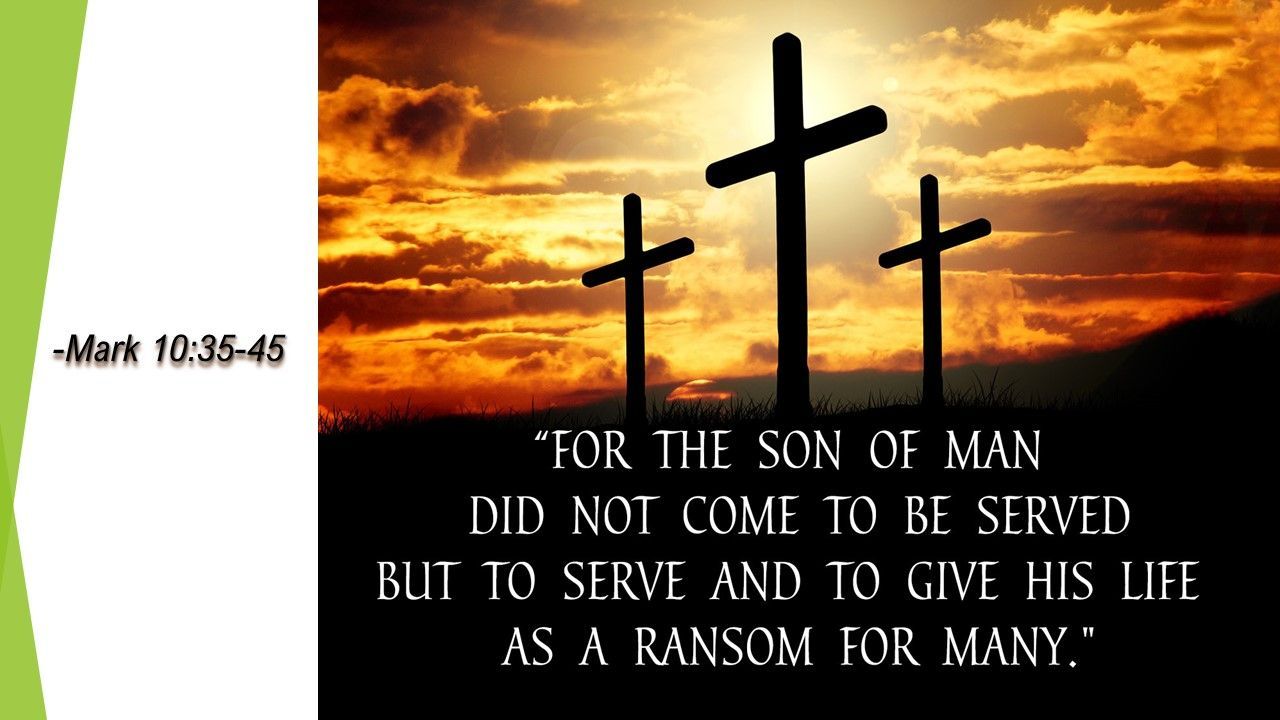Homily - 29th Sunday in Ordinary Time
Homily - 29th Sunday in Ordinary Time - October 20, 2024

Readings: Isaiah 53:10-11; Hebrews 4:14-16; Mark 10:35-45
Dear friends, as you know I arrived about 24 hours ago after travelling for almost 30 hours! I am still recovering from jet lag and struggling to find my bearings, so expect a shorter homily! I am glad to be back home.
Today’s Gospel has a familiar theme: the disciples’ inability to understand the nature of greatness in the Kingdom of God. James and John obviously saw the Kingdom as governed by the same rules as earthly ones - where Jesus would sit on a throne and his favorites sit on his right and left. Jesus realized that they did not fully realize what such a request might entail. In fact, when Jesus came into his kingdom, it was to be a criminal on his right and another on his left
Inevitably, the desire for the favored seats in the Kingdom caused indignation among the other disciples. And so, Jesus again teaches them about the nature of greatness. In the Kingdom, there is no place for those who wish to lord it over others or people who like to make their authority felt.
There have been times in the history of the Church where this teaching has been forgotten and Church leaders have modelled their behavior on that of pagan rulers rather than on their Master. During the Jubilee Year, Pope John Paul II made a public apology for the sins of the Church - acknowledging its misuse of power and abuse of authority. It was recognition that the temptation which affected James and John, and the other disciples is never very far from the life of the Church - and especially those given authority within it.
Many of you may not have such authority in religious matters - but all of us have areas in our life where we may be tempted to wield our own self-importance. This may be in families - in workplaces - or in our social capital. However, if we look at the life of Jesus, we find a very different model of authority. No-one could deny his effectiveness - he changed the world - but he never lorded it over anyone - or forced people to accept his teaching. In Jesus, people encountered the authority of a love that was prepared to give its life for them. Jesus does himself what he asks others to do: to serve, not to be served; to give love freely; to reach out to those in need, not to wait for adoring approval.
It is tempting to be selfish with our time and energy. There are so many plausible excuses for excluding ourselves from the work that needs to be done. But today’s Scripture calls us to examine our conscience, and to face the question, “What can I do for my community, rather than what can my community do for me?
Christian discipleship is a service industry in which there should be no unemployment. There is work for everyone, for all of us. We are not only consumers of grace, or spectators of Christ’s grace at work. Jesus’ kingdom is not about who wears the crown but who bears the cross!
Today is World Mission Sunday, a day set aside to recommit ourselves to the Church’s missionary activity through prayer and sacrifice. Every year the needs of the Catholic Church continue to grow. New dioceses are formed, as houses of formation for those hearing Christ’s call to follow Him as priests and religious. Areas devastated by strife or natural disasters are rebuilt, and as other places are opening up to hear the message of Christ and His Church. That is why the involvement and commitment of Catholics from around the world are so urgently needed. Our support, combined with offerings from elsewhere to the Propagation of the Faith help to support the life-giving presence of the Church across the globe. I am a beneficially of this support as the seven years of priestly formation were funded by the subsidy from such collection. I do not envisage my parents could have managed to support my formation at the seminary with nine other siblings who also needed education. Today, the voice of salvation continues to call us to be more faithful to God’s mission and the words of St Therese of Avila clearly capture our mission.
“Christ has no body but yours,
No hands, no feet on earth but yours,
Yours are the eyes with which he looks compassion on this world,
Yours are the feet with which he walks to do good,
Yours are the hands, with which he blesses all the world.
Christ has no body now on earth but yours”
Homilies











